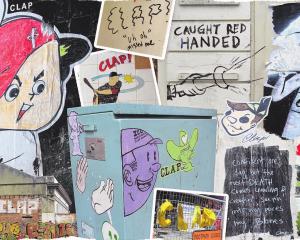THE PRISONER
''It is a scary experience,'' a prisoner told the Otago Daily Times this week.
Fellow inmates ask who you are, who you know and, perhaps most importantly, ''What did you do''.
The prisoner, who cannot be identified, had served time in several other prisons and admitted Otago Corrections Facility was ''probably the best prison I have been to''.
In his mid-20s, he was serving a sentence until the end of 2016.
''You just have to take it on the chin ... I did the crime and I have to do the time.''
But his time is made easier by an acceptance that he needed help, and had to work with authorities, rather than against them.
''I stopped being a little s**t,'' and started seizing the opportunities available.
''There is a lot of stuff you can get out of prison, if you ask.''
He has completed or is completing courses on stopping violence, anger management and parenting.
The inmate recognised he needed to change if he wanted to see his young son again. They had not seen each other since his incarceration.
''I know I will have to jump through hoops. But the reward will be when I get my son back [and] I get to be a father.''
From a good home, he admitted he went off the rails when he was younger.
''But I am lucky. I have seen the good side from Mum and Dad''.
It was easier to ask for help being on the inside than outside, and he was also working towards a trade qualification to improve his employment prospects.
He saw other people who wanted to change, but admitted there was a small number not interested in reform and who were just planning their next crime.
''I just keep to myself. I just do a lot of reading and drawing ... and I am at work all day.''
He had been in a single cell, but the move to a double cell had not been a problem.
''If you are bored at night, you have someone to talk to.''
THE MANAGER
The manager of Otago Corrections Facility has worked for Corrections for 16 years and been a manager for a dozen of those years.
The Milburn prison has the facilities to provide programme interventions and work activities for prisoners.
''It is all about trying to improve their reintegration chances ... for that seamless transition back into community.''
Providing rehabilitation programmes tackling drug and alcohol issues are key areas for modern prisons, in a bid to reduce reoffending.
The prison already provides work-based training and ''we are looking at providing even more employment opportunities - both on site and around the area''.
In addition, prison security enhancements are under way.
Work has been completed on the audiovisual suite, which provides a link from OCF to the courts in an effort to cut down on travel time.
THE CORRECTIONS OFFICER
''I absolutely love it, the different people that you meet. But the main thing for me is being able to help somebody.''
While the ''screw'' label had never gone, prisoners called officers by their name and vice versa.
''When I first started, you didn't talk to them and they didn't talk to you. [Prisoners] had very little to what they have now, and what we do for them now is phenomenal ... it has been a massive change.''
He acknowledges ''the old way didn't work''.
His belief in mutual respect continues beyond the wire, as whenever he meets an ex-inmate on the outside he never mentions prison.
''I see them all the time.
''I treat them as civilians, we shake hands and go on our merry way.''
He had been in the job for 23 years, and ''I see a lot of prisoners coming back, but not all the time''.
''We can only try and hope.''
Nearly 25 years with Corrections meant he had ''started locking up some of the children'' of former prisoners, and was a big believer in present programmes aimed at breaking the prison cycle.
''If they don't come back to jail, than it can only be successful and, in my time, I hope I have helped some people on their way.''
THE EDUCATION TUTOR
His domain is the impressive prison gym, a popular place for inmates to let off steam and achieve their goals.
''Some of these guys, the switch doesn't go on until the 11th, 12th, 13th time ... if you let your cat s... on the carpet it keeps on s...... .''
He introduced a football-inspired yellow and red card system to police behaviour, which had now been adopted by several other prisons.
The red card, which results in the inmate being returned and locked in his cell, had only been used about eight times times during his eight years.
Often, the gym was the first privilege to go if inmates were involved in poor behaviour in the prison.
About 50 inmates were on personal programmes, with one recent success being an inmate who lost 93kg, after initially weighing in at 187kg.
''For me, it is about trying to show people that they can do positive things.''
Games include volleyball, indoor football, touch and basketball, but ''we don't play crash (a popular prison sport in which inmates charge into a defensive line) that is popular in other units''.
The gym was also a gang-neutral place.
''We have white power, Black Power, and Mongrel Mob high-fiving and shaking hands,'' he said.
''It may be only in the gym, but hopefully it transfers into the wing.''












